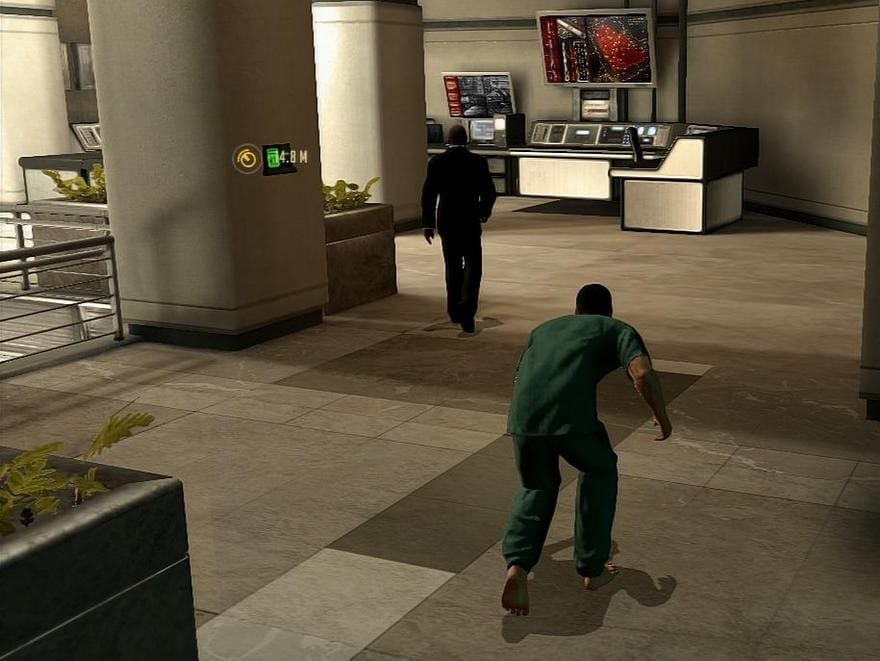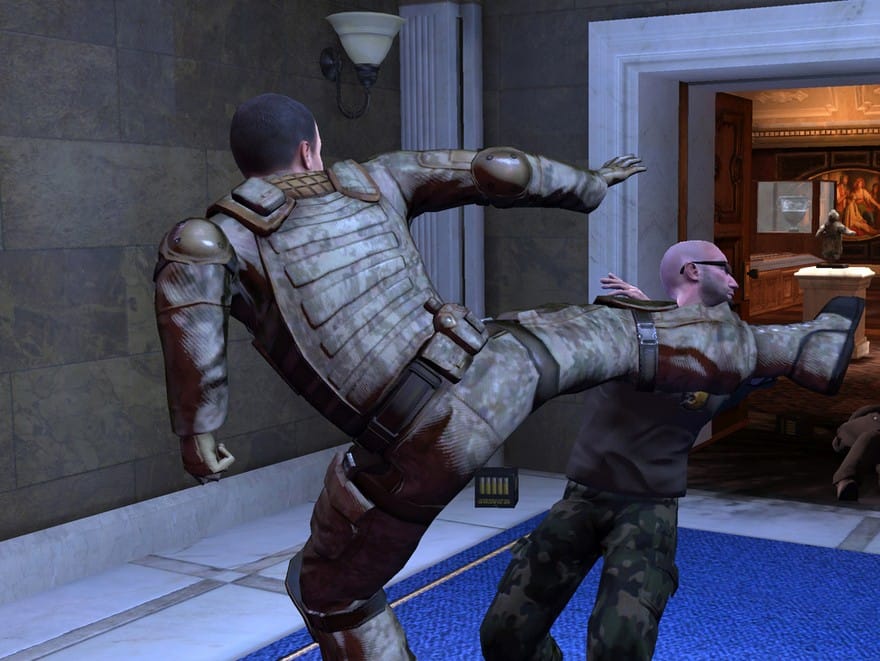It’s time to reconsider Alpha Protocol

Described on release in 2010 as “the espionage RPG,” Alpha Protocol didn’t make the best first impression. For what was ostensibly a stealth game, it tripped up with one vital detail: its sneaking animation. Ass-up, head down: Alpha Protocol’s lead super-spy Mike Thorton shuffles his way through the world of international espionage like no other.
It’s a small thing, but Obsidian’s game was arguably undone by the small things. An uneasy mixture of third person stealth and hidden dice-rolls saw it situated awkwardly within the RPG genre-at-large, and pushed into a market in which it had little place. Inconsistent enemy AI, claustrophobic level design, and a single misjudged animation ensured that it shot just wide of mainstream acceptance, and has gone unnoticed ever since.

Alpha Protocol wasn’t without its charms, though. For those who managed to look past its rough edges—past Mike Thorton’s every pained little step—Obsidian’s game offered a compelling take on the idea of a choice-based narrative. Its disavowal of traditional videogame ethics renders Alpha Protocol a still-fascinatingly playable proof-of-concept, even if no one would ever consider it a great game in its own right.
///
When we’re presented with “choice” in videogames, we’re often asked for a moral judgement. In games that give us the choice to act upon a narrative, we’re either given the choice to do right, or to do wrong, and the game responds accordingly, either with a pat on the back or a cheeky slap on the wrist. To choose one path over the other is to act in accordance with a specified ethical framework: if we choose to do wrong, we acknowledge that we are going to favour ourselves over others, and vice versa.
Any given meter of morality, from Mass Effect’s “paragon/renegade” bar, to Fallout’s numerical “karma” system, ultimately rests on a pre-determined good/bad dichotomy. Our choice is one of action, but never of ideology. In Mass Effect, for example, you couldn’t question the game’s assumption that shooting a rogue arms dealer is a “bad” action, any more than you could question it for assuming that killing hundreds on a quest to recover a family heirloom was a “good” action. Good is good, bad is bad, and you operate knowingly within that framework.
Our choice is one of action, but never of ideology.
This is perhaps why, for all of its faults, the most impressive thing about Alpha Protocol was that it didn’t seem to care.
Alpha Protocol’s storyline constantly threatened to splinter off in any number of directions. The titular Alpha Protocol, a deep-cover intelligence gathering agency, is revealed at an early stage to be corrupt, leaving it up for grabs for a faction or entity of the player’s choice. With this end-point in mind, the player is set loose on an openly-structured series of missions: linear stealth crawls (or, depending on the player’s proclivities, shooting sprees) through any number of themed corridors, each bookended by—and in a few cases consisting of—extended dialogue trees, all of which silently determine who they will be cooperating with or fighting against going forward.
The narrative outcome can differ dramatically from one player to the next—whether they decide to run the straight and narrow in the service of the American government, pander to the ego of corrupt capitalists, or collaborate with religious extremists in the Middle East. One of the few widely celebrated things about the game on release was its chameleon-like narrative structure, one that largely stayed true to its players’ whims.
For both better and worse, this leaves the game itself largely amoral. In the introduction, in an underground bunker labelled “The Graybox,” the player is told that “there are no bad choices, just results,” a line that the game itself follows to the letter. As a narrative device, the Alpha Protocol project seems to be constructed to give its agent—the players—as much ethical wiggle room as possible. By indulging in the fantasy of international espionage, they are granted the freedom to move as they see fit, divorced from scrutiny.
Perhaps the most significant effect of this is that dialogue options are established as a conscious performance. Before the game’s first mission, Thorton is told that he’s been chosen for his mission because he’s “skilled at manipulating others,” and informed about the benefits and drawbacks of angering or befriending contacts. From this point onwards, the real Mike Thorton becomes little more than a product of the player’s imagination; the game refuses to look inwards and speculate on what his controlling player is hoping to achieve, but instead concentrates only on Mike’s outward appearance, focusing on the persona he emits—what he is actually achieving—and how other people react to it. The player isn’t assumed to endorse their actions, removing the inconsistency between intended choice and scripted action present in games like Mass Effect, but dialogue options are instead split into three distinct guises: “suave,” “aggressive,” and “professional,” each of which evoke a very specific performance, sold in the run-up to the game’s release as “Bond,” “Bauer,” and “Bourne.”

In many ways, it bears resemblance to Deus Ex: Human Revolution’s dialogue system: the assumption is that our character isn’t directly manifested in his dialogue choices, but is rather approaching conversation as another facet of their job. Whereas Deus Ex penalised its player for failing to give the “right” performance, however, Alpha Protocol merely runs with it, allowing its player to construct a hellish, Frankenstein’s monster of a persona, one that ebbs and flows between pacifism and psychopathy, and that follows them around for the duration of the game.
Characters angered in the opening few hours can go on to become the game’s focal antagonists; while those that proved the centrepiece of one playthrough can become but footnotes in another. Henry Leland, the game’s initial antagonist, for example, can easily become an accomplice, assuming the player acts in accordance with his wishes; or if the player gravitates towards another villain, he merely becomes sidelined as a stepping stone in a larger narrative. Similarly, friendly or hostile factions can respectively assist or hinder the player on missions, whether in the form of armed troops or intelligence, every relationship forming a very visible piece on a larger chessboard.
If, in most videogames, the issue of choice is predominantly a moral judgement, then Alpha Protocol added another layer to the mix by explicitly surfacing the gamification of its narrative, through the frame-story of espionage.
Alpha Protocol explicitly surfaces the gamification of its narrative through the frame-story of espionage.
It’s a subtle difference, but the spy-game aesthetic shifts the entire perspective of choice in Alpha Protocol, away from building a character and more towards building an ideology. Through their actions, players are consciously setting the course of the narrative, divorced from any in-game assumptions of “right” or “wrong”. They are free to contradict themselves, lie, or to simply change their minds, unconcerned with shaping a believable character, but rather what that character represents.
As a result, Alpha Protocol eschews the trappings of most dialogue systems, in that it doesn’t contain a karma bar or any trite representations of morality or self-worth, but merely tracks the player’s individual relationships on a person-to-person basis. Siding with Al-Samad, the game’s fictional Middle-Eastern terror group, will needless to say put the player in poor stead with the American government, but it is never expressly denounced as “out of character” or “bad.”. Both Thorton and those around him act according to the ideology they are endorsing, without so much as a wink or a nod.
Traditionally, the “bad” option in choice-based videogames finds its appeal voyeuristically. Every “jerk” and “asshole” option plays up to the cameras, often as the comedic underside of an assumed set of ethical values. Outbursts of violence or aggression, like Mass Effect’s infamous interview responses, will never detract from the player’s unending march towards a greater “good”: the narrative’s underlying beliefs are established by the developers and can rarely be genuinely tested, only toyed with.
In Alpha Protocol, however, this voyeurism is largely absent. Siding with an entity will adjust the narrative stakes to reflect their particular outlook, whether that means working towards the downfall of US security or merely earning a vacation for Thorton. Scrutinised up close, the game is an ethical black hole, in which the player is the only effective force of judgement. Based on the player’s allegiances, representations of right and wrong will shift multiple times throughout the game, based on who they know, and how they have approached them.

Perhaps, for this reason, it’s time to reconsider Alpha Protocol. It proves that, for all of our talk of “moral choices,” the issue of choice is still a fertile ground.
Over the last few years, interactive narratives have become increasingly prevalent. Ubisoft’s “Alice” project and the symbolic redefinition of the adventure genre are just symptoms of a larger push towards storytelling in videogames, a push led by an evolving idea of “choice.” The void between a developers’ scripting and the player’s interaction is now under more scrutiny than ever.
Although, at its worst, Alpha Protocol didn’t quite live up to its ambition—certain characters are left unused or forgotten, a large number of plot strands are left untied, and it’s worth reiterating that that sneaking animation really is something else—at its best, it seemed to genuinely engage with the player’s choices, regardless of how objectionable or absurd they may have been. At its best, it seemed like the game didn’t care who, or what, you were fighting for, but rather fully embraced the notion that players could have the choice to fight for what they wanted.
We often talk about the gray areas in videogames as resting between the predetermined rock and a hard place of one bad or another; between black and white. Alpha Protocol, however, in providing the player with a blank slate on which to impress their ideological leanings, proved that gray isn’t just a space between two colours, but has the potential to be a colour in its own right.



